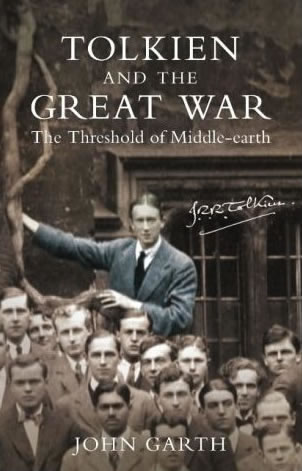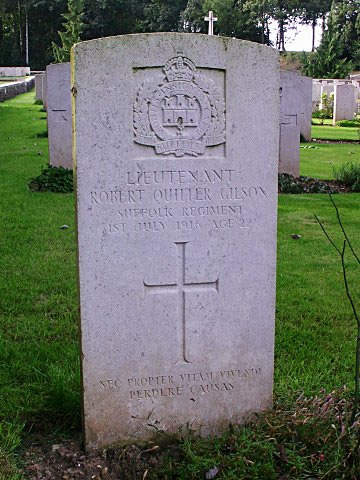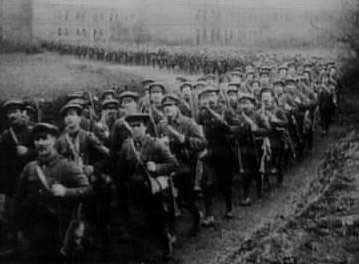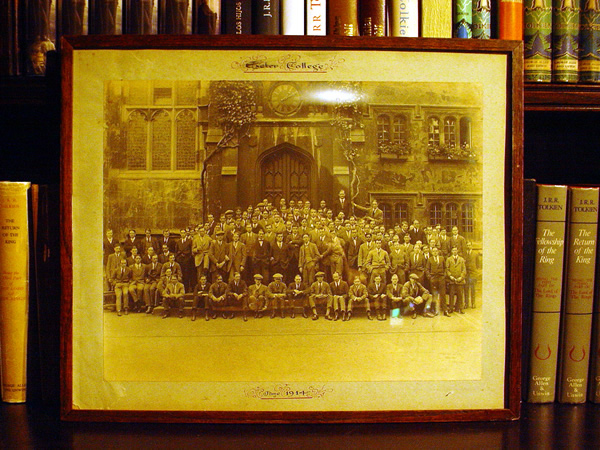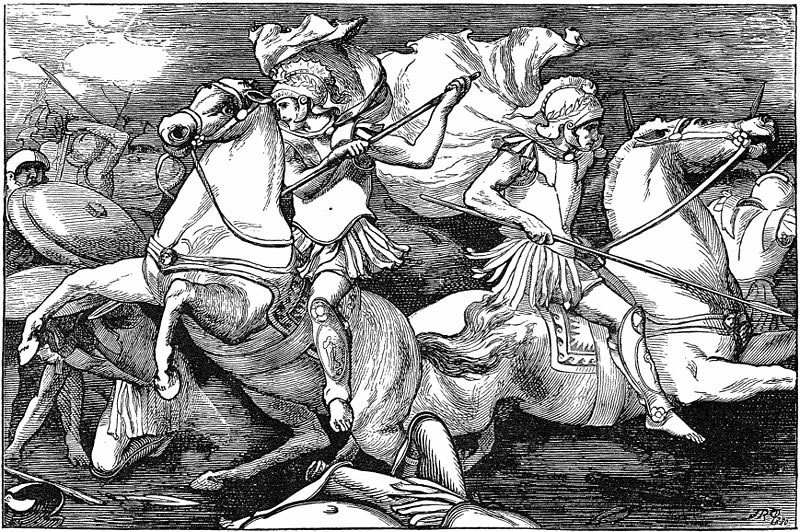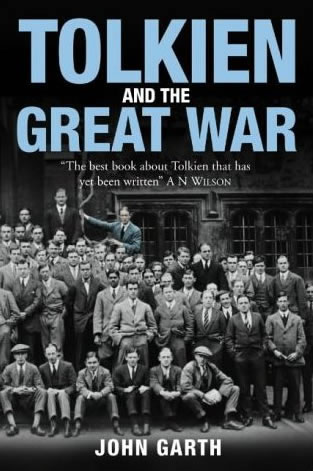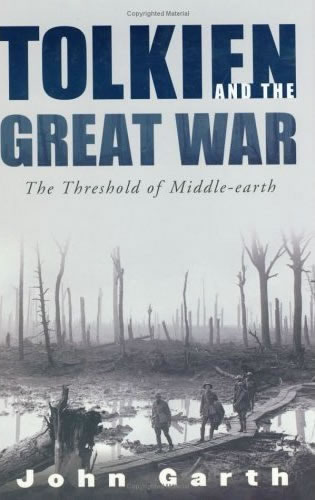Interview with John Garth, author of Tolkien and the Great War (28.03.09 by Pieter Collier) - Comments
Once in a while one reads a book and immediatly understands it is an important addition to what we already know about J.R.R. Tolkien. Some time ago I read the fabulous book by Diana Glyer, The Company They Keep, and understood right away its importance. It reminded of another book I read before, namely Tolkien and the Great War: The Threshold of Middle-earth by John Garth, that from the first time I read it left a big impression on me. It is all together a very different book and a completely different topic and writing style, but also one of the standard references on Tolkien. When we celebrated the release of The Children of Hurin, during The Children of Hurin Release Party on 7 April 2007, one of the sheduled guests for the chat event was the author of this book, John Garth. Sadly enough he fell sick and he was replaced in the last hour by an equally interesting author John D. Rateliff, author of The History of The Hobbit. Since it is now about 2 years since the publication of The Children of Hurin I'm happy to say that I'm finally able to release the following interview to the Tolkien community and very gratefull for the time John Garth has put into it. I truly hope you all enjoy this Q&A as much as I did and learn some more about John Garth and his fantastic Tolkien and the Great War, one of the Tolkien biographies that should be read by anyone interested in to Tolkien.
The Interview with John Garth
JG: I'm the author of Tolkien and the Great War: The Threshold of Middle-earth, winner of the Mythopoeic Scholarship Award for 2004 and published in the UK, US, Italy and China. I make my living as a freelance journalist, writer and copy-editor both online and in print. I've published opinion pieces on Tolkien in the London Evening Standard, and I contribute occasional book reviews to a number of British national newspapers. I'm a member of the review panel for the journal Vinyar Tengwar, which publishes posthumous items from among tolkien's papers on Quenya, Sindarin and his other invented languages.
TL: How did you first get interested in Professor tolkien's works?
JG:
This goes right back to childhood. We had a copy of The Lord of the Rings on recommendation from my uncle, who used to read it once a year. I would open it and gaze at the maps - I can still remember the intense, mysterious flavour of those names, those rivers, forests and mountains, back when I had knew nothing about the story. One evening in March 1976 I picked it up and began reading. I was entranced. I'm a little amazed now to look back and realise I was just nine years old. Within the next year I'd read it four more times, and of course I was just in time to devour The Silmarillion when that was finally published in September 1977.
TL: Since I was only born in 1977 I have always wondered how big the release of The Silmarillion was? Was it similar to the release of The Children of Hurin? How was the reception of the book and what was your first idea about the book?
JG:
Of course there was no internet in those days, so publicity was all in print - and perhaps on air, though I didn't spot any of that. Christopher Tolkien was interviewed in The Sunday Times Magazine by Bill Cater, who had once interviewed his father - 'The filial duty of Christopher Tolkien' was the headline. George Allen & Unwin produced posters, stickers and newspaper adverts showing the Lúthien motif used for the dustjacket. I remember all this because I had them stuck up all over my bedroom. But no, I don't think the fanfare was as big as it was for The Children of Húrin, even thoughThe Silmarillion had been more eagerly awaited for much longer. Publicity was not such a mass industry then - and there were no movies to stoke up wider interest (the Ralph Bakshi Lord of the Rings cartoon appeared the following year and was by no means as successful as Peter Jackson's trilogy).
JG: It started as an article for a fanzine, but rapidly outgrew that. The idea of writing about tolkien's wartime experiences came from a conjunction of two things I was doing at that time.
One of the key pleasures in tolkien's works, for me, has always been his invented languages. At this time I was trying to catalogue all the many manuscripts, notes and typescripts reproduced in The History of Middle-earth, along with all the elements of Quenya, Sindarin, and other invented languages they contained. The project was vast, and rather arid; I eventually abandoned it. But without it I would not have written Tolkien and the Great War.
For pleasure I was also reading a couple of novels about the First World War - specifically Sebastian Faulks's terrifyingly kinetic account of the Battle of the Somme in Birdsong, and Pat Barker's reconstruction of the wartime lives of the poets Wilfred Owen and Siegfried Sassoon in Regeneration.
So when I came to noting the provenance of some of tolkien's early faërie poems - army camps in Lichfield and Cannock Chase, Staffordshire, or in Etaples, Northern France, I was very struck by the apparent disjunction between what he was writing about and what he was experiencing at the time. That's what I wanted to explore - though the more I explored, the more I understood that there was no real disjunction at all.
TL: How come you choice to write about the war? Is it one of your fascinations?
JG:
I've never been interested in military regalia or tradition, and when I've tried my hand at wargaming I've discovered I am a lousy strategist. But I've always been powerfully moved by tolkien's depiction of war. At the age of 12, rereading The Siege of Gondor at a remote cottage in Wales during a family holiday, I felt moved enough to decide I was a pacifist. I'm no longer so certain of my views on the rights and wrongs of war; but the sense that Tolkien was describing something very real has remained with me, whereas the idea that his writings are simply escapist has always struck me as rather myopic.
TL: What challenges and other interesting moments did you have researching tolkien's wartime experiences?
JG:
The real godsend was that his service record became available just as I was becoming interested in learning what he did. The UK National Archives (known at that time as the Public Record Office) kept officers' service records closed until January 1998, for reasons of privacy, but I was first through the door the day they were released.
The big drawback, I immediately realised, was that his actual service record didn't have much to say about war, but dealt almost exclusively with the ups and downs of his health after he was sent back to Britain with trench fever after fighting in the Battle of the Somme. To determine what the Somme was like for him, I had to study intensively the records left by his battalion and those around it, and find other the eyewitness accounts that covered closely similar parts of this enormous battle. I found it both fascinating and moving to handle pages handwritten by men in the most awful hell of the trenches - including intelligence reports by G.B. Smith, tolkien's friend and fellow member of the TCBS, the Tea Club and Barrovian Society that they had formed at King Edward's School in Birmingham.
One of the things I loved about the research was seeing how all the pieces fitted together chronologically. I had long been familiar with the letter quoted by Humphrey Carpenter in J.R.R. Tolkien: A Biography in which Smith calls himself 'a wild and whole-hearted admirer' of tolkien's writings. But no one - not even Carpenter, I'm sure - knew that Smith wrote this letter just before heading out on a deadly dangerous night patrol in No Man's Land on the Somme. The officer leading the previous night's patrol had not come back - he was captured and died of his wounds - so Smith was truly writing what he thought might be his last words to his friend John Ronald.
I visited the Somme battefield, tracing tolkien's steps with old trench maps. I also went to the Holderness peninsula, where he was based for much of 1917 and 1918 - and I think I located the 'hemlock' wood which inspired the tale of Tinúviel.
TL: How long did it take to write Tolkien and the Great War?
JG:
I started in January 1998 and it was published in November 2003, so five years altogether - though there was a big hiatus between the first draft, completed in summer 1998, and resuming the book in 2001 once I'd signed a deal with HarperCollins. I wrote nothing during that hiatus but did so much research that launching into the second draft became a major challenge.
TL: What was / is your hope for your readers?
JG:
I hope they will be able to re-read tolkien's works with new eyes, knowing what he had been through and the circumstances in which Middle-earth was first created.
TL: A lot of your book finds origin in the surviving correspondence with his friends in the T.C.B.S. Can you tell us some more on where you found these letters and how important they are?
JG:
Even after my site visits and all my research in official records and Rob Gilson's papers, my book still seemed to me to lack a human heart. But then the Tolkien Estate graciously allowed me to examine the letters between Tolkien and the other 'TCBSians', Smith, Rob Gilson and Christopher Wiseman. These are kept among his family papers in the Bodleian Library in Oxford, where I spent long days poring over them and wishing I had longer with them. Through them, I learned to care deeply about these young men, and to understand what a vital part they played in the early evolution of tolkien's legendarium. As the letters show, his poetry about the 'fairies' of Eldamar, the benighted men of Aryador and the mariner Earendel was read in its entirety by the TCBS, who were amazed, enthusiastic and sometimes critical. Smith, a fellow poet, provided unstinting encouragement, and I suspect the memory of his praise carried on inspiring Tolkien in later years. Wiseman was robustly critical, but I think this worked positively by forcing Tolkien to think harder about what he was trying to achieve. As a whole, the letters brought tolkien's experiences leaping into life, and I saw that a book about the Great War could not just be about battle but must also deal with the abrupt maturation and separation of friends and loved ones; military training and convalescence; and cataclysmic changes in culture and personal worldviews.
TL: How essential was the input of Christopher Tolkien? And that of Christopher Wiseman's widow?
JG:
Christopher Tolkien had to give his approval before my book could be published, because of a long-standing agreement with HarperCollins and because I had used his father's personal papers. So although I have never met or spoken with Mr Tolkien, I had a long and detailed correspondence with him. He was intensely vigilant, invariably pointing out instances of woolly thinking and encouraging me to disentangle fact and opinion; so I think the book is much more honed and well structured than it would have been without his input.
I interviewed Christopher Wiseman's widow Patricia at her home in Milford-on-Sea, Hampshire - a delightful experience, though frustrating for both of us in that she had only met him relatively late in his life (in the 1960s) so she could not answer many of my questions. Unfortunately, as she revealed, he was deeply unsentimental about possessions, and had not kept any correspondence from Tolkien or the other TCBSites. She described how Humphrey Carpenter had visited with tolkien's collection of TCBS letters while researching his biography, and she and her daughter had read them avidly; but her husband had just been left deeply saddened by the reawokened memories.
TL: Have you learned new things about Tolkien during the process of writing the book?
Also much more vivid and complex than I had realised was tolkien's personality as it emerged in the TCBS letters - awkward, proud, isolated, but fond of hilarity and very much loved and admired by his friends.
In terms of tolkien's writing, I came to understand at least some of the complex ways in which he translated his life and learning into the stuff of Middle-earth. It's not enough to say the Great War inspired his writings. For a start, that's not the whole picture, because there were other inspirations too, such as Beowulf, The Aeneid, philology. But also the war had many faces, some of them less familiar than others. For example, it's fairly clear that the iron 'dragons' in the 1916-17 Lost Tale of the Fall of Gondolin were inspired by the tanks which had just made their debut on the Somme when Tolkien was there. Yet the war was also a fertile ground for new words and phrases, as well as powerful new 'mythologies' about the cultures of the fighting nations; and I think these factors must have contributed to tolkien's sudden realisation of the connection between language and myth, which he said happened at that time and claimed was crucial in the invention of Middle-earth.
Related to this, I saw that he worked in spurts of creative growth, and yet the periods when he was not writing could provide him with the inspiration he needed for his creativity. The horror, misery, grief and terror of war - and its exhilaration and moments of heroism - certainly came out in what he wrote; but I think the boredom of military training was crucial too, because it left him free to turn these experiences through the mill of his own highly individual mind. (Remember how he wrote the first line of The Hobbit on an examination paper during the tedium of marking?)
I also realised how extraordinarily self-contained Tolkien was. Even his closest friends were astonished in 1915 when he suddenly unveiled the first poems of his mythology. A 'bolt from the blue', Wiseman said, just as C.S. Lewis later called The Lord of the Rings 'lightning from a clear sky'. It seems that Tolkien, though cherished by his friends, was elusive and private. Of course his creation of a whole mythology and its attendant languages placed huge demands on his time. If he had been less private, his legendarium might have received more encouragement and been published sooner - but then it would have been very different from what we know now.
TL: Did you find out more information since the publication of your book?
JG:
I found out a lot more about tolkien's life at Exeter College, Oxford, where he was a student when war broke out.
I've also found out more about G.B. Smith's background, and about others of tolkien's other fellow students and comrades in arms. Perhaps I will find the opportunity to publish some of this material some time - perhaps if there is a further edition of Tolkien and the Great War.
One of my regrets is that I did not manage to find out much about tolkien's brother Hilary, who had been close to him until recently and who also enlisted as a soldier. So I'm very much looking forward to the forthcoming biography of Hilary being written by Angela Gardner.
TL: In your book you argue persuasively that Tolkien did not create his mythos to escape from or romanticize the war. Rather, the war gave dimensions to a mythos he was already industriously exploring. The war must nonetheless have had a profound effect on tolkien's mythology. In what way did the war influence Tolkien and his works?
JG:
Just how the process of influence worked is a big question which I try to answer in my 'Postscript', the final chapter ofTolkien and the Great War, and have since examined further in several conference presentations where I discuss The Lord of the Rings in relation to tolkien's war.
For a start, Tolkien admitted several influences: for example, he said Sam Gamgee was inspired by the privates and batmen (officers' servants) he knew in the British Army; he said his own interest in fairy-stories was awakened by war; and he admitted the experience of war prompted him to centre his epic around an on-going conflict between good and evil. Already you can see that inspiration operated on several levels. There is the influence of specific detail (Sam and the batmen); effects of war on literary appreciation and approach (fairy-story); and its impact on moral vision (good vs evil). And there are others effects too numerous and complex to go into here.
In a nutshell, the war affected tolkien's writing as much as it affected Wilfred Owen's, to name the most famous 'Great War poet'; but what Tolkien did with his experiences was utterly different because his imagination was primarily mythopoeic rather than 'naturalistic': symbolism, rather than reportage, was the larger shaping force in his creative outlook. Having said that, the very specific flavours of life during wartime come through quite directly, especially inThe Lord of the Rings in the experiences of the hobbits (not to mention the orcs).
Those who are interested should read my Postscript, and have a look at my papers 'Frodo and the Great War' (in The Lord of the Rings 1954-2004: Scholarship in Honor of Richard E. Blackwelder
) or ' "As under a green sea": visions of war in the Dead Marshes' (slightly different versions of which appear in Myth and Magic: Art According to the Inklings (Cormare),
edited by Eduardo Segura and Thomas Honegger, Walking Tree Press 2007, and The Ring Goes Ever on - Proceedings of the Tolkien 2005 Conference, edited by Sarah Wells, Tolkien Society 2008).
TL: In your analysis of the Tale of Lúthien you write that the "crux of tolkien's narrative [is] the moment when the small but indomitable confronts the demonic embodiment of domination and destruction." Does this also fit for other tales by Tolkien, like The Lord of the Rings and The Hobbit?
JG:
Quite so: this is a central theme of both books - because both have their origins in the defining experience of tolkien's generation, in which he and almost all the other young men he knew were sent far from home to pit themselves body and soul against bombs, poison gas and machine guns.
TL: In your book I read that Tolkien and Wiseman nicknamed themselves "The Great Twin Brethren". Could this be an explicit reference to one of Thomas Babington Macaulay 's lays, "The Battle of the Lake Regillus"? And could it be Tolkien used it as an inspiration for king Theoden's sudden appearance on the Pelennor Fields?
In any case, I suspect strongly that Theoden's charge and death, along with the fate of the House of the Hammer of Wrath in 'The Fall of Gondolin' and tolkien's obsession with Beorhtnoth's ofermod in the Old English poem 'The Battle of Maldon' owed much to events in his own battalion in July 1916, when an officer was censured for leading his men beyond their objective, resulting in appalling loss of life by what we call nowadays 'friendly fire'.
TL: Can you clarify some more about Tolkien and horses? I never heard about Tolkien being any good with horses; only your book claims Tolkien was.
JG:
As an undergraduate Tolkien trained with King Edward's Horse, a cavalry regiment, rather than the Officer Training Corps which many other students joined. However, that may have had nothing to do with a preference for horse riding, and been simply because he was born in Bloemfontein, South Africa: students of 'colonial' origin were automatically directed to the cavalry regiment.
In my book I wrote that Tolkien 'had a strong affinity with horses, which he loved, and became a de facto breaker-in. No sooner had he broken one horse in but it was taken away. Another would then be given to him and he had to start the process again.' I now feel I should have hedged a little. The anecdote is based on a very brief unsigned report of a conversation between members of the Tolkien Society and Michael and Priscilla Tolkien in the 1970s, published in an early issue of the society bulletin Amon Hen. There are no direct quotes, and (as I point out in my comprehensive endnotes) the report is mistaken in at least one major point - that Tolkien began his war service with King Edward's Horse. In fact he left that unit in January 1913, and began training for war service as an infantry officer two and a half years later.
The picture has since become even muddier, with the publication on the internet of an extended anecdote, attributed to Michael Tolkien, in which the creation of the Black Riders was credited to a wartime experience. The story goes that Tolkien was lost on horseback when he spotted a mounted cavalry group and rode towards them - only realising too late that he was behind enemy lines and the cavalrymen were German. They are then said to have given chase but been outpaced by Tolkien. It's a vivid and exciting story, with colourful details, but to my mind quite implausible. Although there were horses on the Somme, and I found independent reports showing that officers in tolkien's battalion sometimes used them to get around on the battlefield, the likelihood of being able to pass behind enemy lines on horseback seems extremely small. It may also be worth noting that nothing similar is recounted in the Tolkien Family Album, the down-to-earth 1992 memoir by Priscilla and John Tolkien.
TL: How did you go about obtaining permission to use and publish some of tolkien's previously unpublished letters and manuscripts for Tolkien and the Great War?
JG:
I simply wrote to the Tolkien Estate and asked. Not everything was forthcoming, but the material I was allowed to see was invaluable.
TL: Houghton Mifflin announced Tolkien and the Great War as "the first substantially new biography of Tolkien since 1977." Where do you place your book yourself?
JG:
The description is true so far as it goes. There have been quite a few biographies of Tolkien since 1977, especially around the time of Peter Jackson's Lord of the Rings movies, but they have all been based almost entirely on Carpenter's, supplemented by press cuttings. My book was the first to make use of primary material from tolkien's papers, supported by wide-ranging research in other unpublished sources. Of course, it focuses almost exclusively on the years 1911 to 1919, a fraction of tolkien's life, so in that sense it is not a full biography.
TL: Tolkien himself was deeply suspicious of biographies of authors, and especially of psychological interpretations of those biographies; like Kipling, he wanted readers to "Seek not to question other than / The works I leave behind." Did tolkien's view have any effect on you as a biographer?
JG:
tolkien's objections to biography are understandable. Fairly suddenly, this fundamentally private man found the world taking a huge interest in him. And The Lord of the Rings was so utterly new that it left commentators floundering for a foothold, so that he often found himself misdescribed and misunderstood. At the time, many critics favoured Freudian approaches, which cannot have been welcome.
Others simply seemed to have rather short memories - as Tolkien noted in his preface to the second edition of the book: 'One has indeed personally to come under the shadow of war to feel fully its oppression; but as the years go by it seems now often forgotten that to be caught in youth by 1914 was no less hideous an experience than to be involved in 1939 and the following years. By 1918 all but one of my close friends were dead.'
I think, however, that this comment justifies my inquiries in Tolkien and the Great War. Tolkien indicates fairly plainly that The Lord of the Rings was affected by his own experience of war - but implies that the First World War was at least as important as the Second.
My approach has been to examine the step-by-step creation of Middle-earth (as Tolkien would later call it) against the background of what was happening to Tolkien and in the world around him. It brings up all sorts of fascinating parallels, some of which I have pursued (including a number of links that Tolkien himself made explicitly between his life and his created world). More significant, though, is the overall impetus given by the change of the world, by soldiering, and by the loss of his friends.
TL: Are you planning to publish any new Tolkien related books in the future?
JG: Many people who liked my book have told me they would like to read a sequel. One day, perhaps. And aside from the relation between his life and his creative output, there are particular aspects of Tolkien that I would love to examine if I have the time - perhaps as a book, perhaps not.
TL: When you're not working, what are your favorite ways to relax and have fun?
JG: Tolkien and the Great War was written in my spare time when I worked for the London Evening Standard, so for two full years I had no time to relax at all. Thankfully it was vastly more satisfying than all the 'fun' I suppose I missed. And now? I read as much as possible, and quite widely: recently I've enjoyed George Eliot's quasi-fairy-story Silas Marner,
Richard Fortey's palaentological Trilobite!, Antony Beevor's harrowing history Berlin, and George Martin's Summer of Love, about the recording of Sgt Pepper's Lonely Hearts' Club Band. Naturally, I also listen to music, and wish the iPod had been invented earlier. With my wife Jessica, I love exploring Britain's green spaces and old towns - and, in all times and places, being with our daughter Lorelei, born in December 2008.
TL: One final question: We know they are going to make a Hobbit movie. How do you look to making films of the books? Or would you prefer a film about the life of Tolkien?
JG: Doubtless I will watch the Hobbit movie, and I will probably enjoy it, too - I've certainly been impressed by Guillermo del Toro's other work, especially the haunting The Devil's Backbone.
I don't expect to find it quite as taxing as watching Jackson's free-ranging adaptations, during which I was forever torn between amazement at the visuals and horror at the liberties being taken with tolkien's story. If I were a filmmaker, I would stick more closely to the source material - but that risks being slavish. A film about tolkien's life? That would be rather uneventful - except for his time in the Great War.
Spread the news about this J.R.R. Tolkien article:

